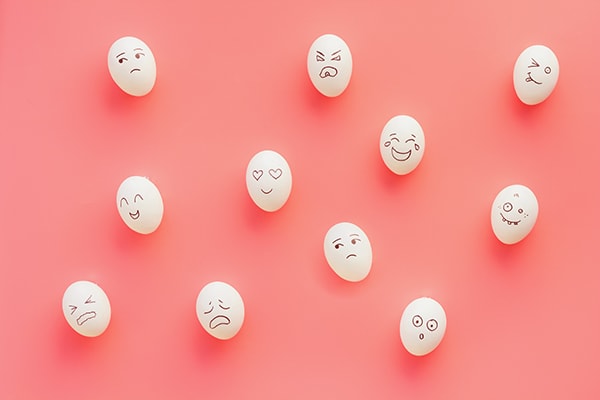I’m spending my days with my cat and my laptop on my tiny apartment balcony writing about how people are adapting to this pandemic, while also stressing over things that are entirely out of my control. And I’m sure I’m not the only one.
Could mindfulness help? Ashley Poynter, founder and CEO of Content Rewired, believes it can. “We have to see what is in front of us,” she says. Poynter has been guided by mindfulness throughout her career. One of Poynter’s motivations for founding Content Rewired was to gain more control over her everyday work life. “I wanted to be more mindful of what I was working on,” she says. Mindfulness focuses her daily practice and boosts her productivity.
We spend our days writing for other people, but there are benefits to writing for ourselves, too: Reflective writing can help us tune into who we are, and how we’re doing. “You can cultivate a relationship with yourself through writing,” says Reinekke Lengelle, a writer, researcher and career writing pioneer. Lengelle teaches her students how to find themselves through therapeutic career writing, a branch of self-writing that uses writing exercises to examine who we are and where we fit in the world of work. Lengelle shared some of her techniques for cultivating mindfulness and self-awareness with us.
Here’s how you can take control amid the chaos to clear your mind and contribute creatively through content marketing mindfulness.
Identify Your Stressors
Stressful thoughts place a considerable block on our creativity and productivity. If we can pin down what our primary sources of stress are, then we can free ourselves from their control. That’s the concept behind The Work by Byron Katie, an author and speaker who teaches about self-inquiry. When we believe our thoughts, we’re stressed out. But when we inquire about them, we realize they aren’t always true.
Identify your stressful thought and ask yourself the following four questions about it. Lengelle walked me through this exercise verbally, and I’ll share my journey cultivating mindfulness through “The Work. My primary stressor has been the lack of control I have over the chaos unfolding around me. I live in Louisiana, a state hit hard by the virus. My brother, a paramedic, fights on the frontlines. My mom, recently appointed interim director of nursing at a nursing home, fights tirelessly to minimize the virus’s impact on her vulnerable patient population. I chafe against my comparatively sedentary lifestyle, and I’m stressed out by the thought that I’m not doing as much as I can to help.
- Is it true? Well, I’m not medically trained. So there isn’t anything I can really do to fight the virus — aside from what I’m already doing, which is staying put to minimize its spread and hand-sewing the occasional face mask when I have time. So the answer is no, it’s not true.
- Can you absolutely know that it’s true? No, but I can say pretty confidently that it’s not true.
- How do you react when you believe your stressful thought? “Examine what the thought is costing you,” Lengelle told me. When I believe that I should do more to control what’s going on around me, I lose focus. Producing content when stress is overwhelming becomes nearly impossible, which only exacerbates that stress. “You’ve projected yourself into that outside world where you feel like you should have more control,” Lengelle says. “So nobody’s home to do your work.” I realized that feeling stress or guilt over “not doing enough” was costing me my ability to do what I can, which is producing valuable content to guide readers through this crisis.
- Who would you be without the stressful thought? I would be just me, sitting on my tiny balcony with my cat and my laptop. When I don’t believe the thought that I should be doing more, then I can actually be present where I am now. I don’t have any more or less control over what happens in the outside world than I did before, but I can control where I am and what I write. “When you experience that for a moment, suddenly you’re free,” Lengelle says. “There’s a beauty to us opening our eyes to reality.”
The final step of The Work is to turn the stressful thought around to its opposite. In this case, I was able to find where I do have control. And that’s over my work. As a fellow content creator, Poynter echoes this sentiment: “The paradox of our situation is that the easier you are on yourself, the more capacity you have for being creative,” she says.
Find Inspiration in Your Own Words
Journaling and written meditation can help us recenter ourselves throughout our workday, and they can both be helpful in cultivating content marketing mindfulness. “I meditate in the mornings,” Poynter says, “to clear out ancillary thoughts that would pull my focus away from what I need to work on.” She also takes breaks between tasks to check in with herself through a stream of conscious writing meditation, or even some creative writing.
“Just sit, pick a topic, and write whatever comes to mind on it,” Poynter explains. “It’s nice to take a break from the business side of writing to flex your creativity.” Taking time out of her day to be creative boosts her energy and productivity, she says.
Lengelle advocates cultivating mindfulness through poetry. This offers an outlet for coping with trauma and grief — collective feelings as COVID-19 wreaks havoc on our world. Poetry allows you to acknowledge and show reverence for moments of sadness, like hearing about the number of deaths caused by the virus or learning a friend lost their job.
“Instead of cultivating stress, have an authentic feeling about it,” Lengelle says. You don’t have to share your poems — just expressing the thought helps you demonstrate reverence and honor for those affected.
Unleashing these feelings helps us free up our creative bandwidth to spend on doing great work.
A Writing Exercise for Content Marketing Mindfulness
Another source of stress (and writer’s block) are the limits we put on our own creativity and capacity to cope with a crisis. But limits, like the stressful thoughts, can be questioned. “We have more resources internally than we could possibly imagine,” Lengelle says.
Here’s an exercise Lengelle recommends for pushing past our self-established boundaries. Think of someone whose work and spirit you admire. Let’s use Williams Wordsworth as an example. I spent a lot of time in grad school studying his creative philosophy, which posited that the subject of poetry should be the everyday. Think of the difference between The Iliad, which recounts the epic battle at Troy, and this poem, which shows the speaker visiting a vibrant field of daffodils and finding joy in remembering the sight.
The profoundness of your responses when you write from someone else’s perspective may surprise you. It allows you to break through the limitations set on your own thoughtfulness. I “asked” the great poet whether the work I do everyday matters in the larger context.
“What you are doing is valuable,” he might say. “Recording and sharing stories of everyday lives during times of turmoil is one of the most important outcomes of any historical moment. Why do you think we’re so fascinated by the ruins of Pompeii?”
But is there a greater purpose? What value am I adding?
“History isn’t only made on battlefields,” my muse continues. “It’s the collection of everyday moments that change the course of time, and providing value where you can does make a difference.”
I’m doing my part to keep the economy moving, and I’m providing value to my clients. I’m staying home to prevent the virus from spreading further. I’m where I should be, doing what I need to do.






